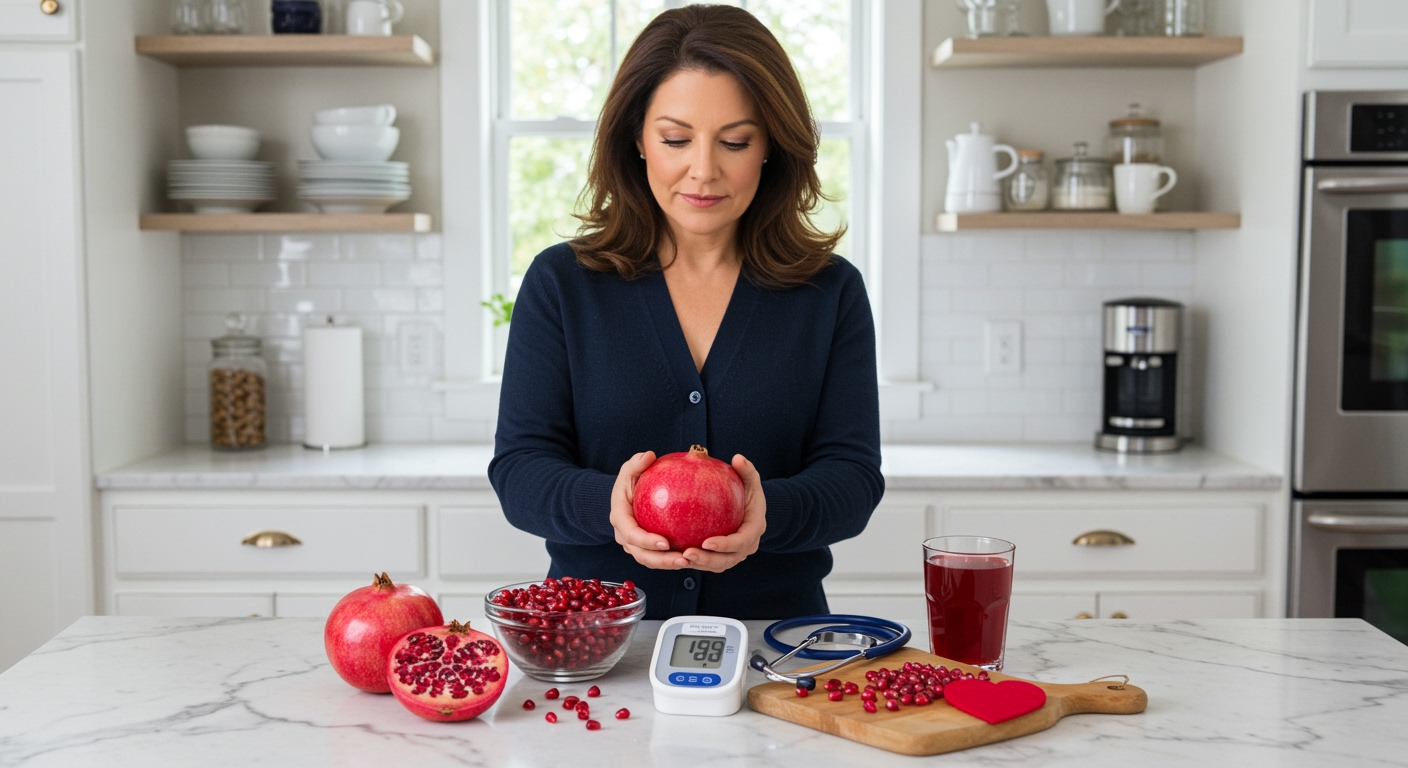✪ Key Takeaway: Pomegranate may worsen low blood pressure by further reducing already low readings through its potent vasodilating compounds.
Introduction
Your doctor just told you that your blood pressure is too low, and now you wonder if that daily pomegranate juice is making things worse.
People with hypotension often feel confused about which foods help or harm their condition, especially when popular health foods like pomegranate get praised for heart benefits.
Hi, I am Abdur, your nutrition coach, and today I am going to explain exactly how pomegranate affects low blood pressure and whether you should avoid this ruby red fruit.
How Does Pomegranate Actually Affect Blood Pressure?
Pomegranate contains powerful polyphenols called punicalagins that act like natural blood pressure medications in your body.
These compounds work by increasing nitric oxide production in your blood vessels, which causes them to relax and widen.
When your blood vessels dilate, your blood pressure naturally drops because your heart does not need to pump as hard to move blood through wider pathways.
Research shows that drinking pomegranate juice can reduce systolic blood pressure by 5-21 mmHg and diastolic pressure by 2-11 mmHg within just a few hours.
For people with normal or high blood pressure, this effect provides excellent cardiovascular benefits and protection against heart disease.
However, if you already have low blood pressure readings below 90/60 mmHg, this additional pressure reduction can push your numbers into dangerously low territory.
✪ Fact: Pomegranate juice contains three times more antioxidants than red wine or green tea.
What Symptoms Should You Watch For?
When pomegranate consumption drops your already low blood pressure further, you may experience several uncomfortable and potentially dangerous symptoms.
Dizziness and lightheadedness often occur first because your brain receives less oxygen-rich blood when pressure drops too low.
You might feel weak or fatigued throughout the day, even after getting adequate sleep, because your organs struggle to function with reduced blood flow.
Some people experience fainting spells or near-fainting episodes, especially when standing up quickly or during physical activity.
Nausea and blurred vision can also develop as your body tries to compensate for insufficient blood circulation to vital organs.
Cold hands and feet become more noticeable because your body prioritizes blood flow to essential organs over your extremities when pressure drops.
If you notice these symptoms worsening after consuming pomegranate products, you should consider reducing or eliminating them from your diet temporarily.
✪ Pro Tip: Keep a blood pressure log to track how different foods affect your readings throughout the day.
Should You Completely Avoid Pomegranate With Hypotension?
Complete avoidance of pomegranate may not be necessary for everyone with low blood pressure, but careful moderation and timing become crucial factors.
The key lies in understanding your individual response and working with your healthcare provider to determine safe consumption levels.
Small amounts of fresh pomegranate seeds may cause less dramatic blood pressure changes compared to concentrated pomegranate juice or supplements.
Timing your consumption matters significantly because eating pomegranate with meals can slow the absorption of its active compounds and reduce their immediate impact.
Some people with mild hypotension can safely enjoy pomegranate occasionally while monitoring their symptoms and blood pressure readings closely.
However, if you take medications for low blood pressure or have severe hypotension, you should discuss pomegranate consumption with your doctor before making any dietary decisions.
Your healthcare provider can help you weigh the antioxidant benefits of pomegranate against the potential risks of further lowering your blood pressure.
✪ Note: Pomegranate supplements are more concentrated and may have stronger effects than whole fruit.
What Are Better Fruit Options For Low Blood Pressure?
Several fruits provide excellent nutrition without the blood pressure-lowering effects that make pomegranate problematic for hypotension sufferers.
Bananas offer high potassium content that helps regulate blood pressure naturally while providing quick energy from natural sugars.
Apples contain fiber and natural sugars that support steady energy levels without dramatically affecting cardiovascular function.
Oranges and other citrus fruits provide vitamin C and folate that support overall heart health without causing significant pressure changes.
Grapes offer antioxidants similar to pomegranate but with much milder effects on blood vessel dilation and pressure reduction.
Berries like strawberries and blueberries provide powerful antioxidants while having minimal impact on blood pressure regulation.
These alternatives allow you to enjoy fruit benefits while avoiding the specific compounds in pomegranate that can worsen hypotension symptoms.
✪ Pro Tip: Pair fruits with protein or healthy fats to slow sugar absorption and maintain stable energy levels.
The Bottom Line
Pomegranate can indeed worsen low blood pressure by further reducing already insufficient readings through its powerful vasodilating compounds.
When managing hypotension, every food choice matters because small changes can create big differences in how you feel daily.
I would love to hear about your experiences with pomegranate and blood pressure in the comments below, and please share any questions you might have about managing hypotension through nutrition.
References
At NutritionCrown, we use quality and credible sources to ensure our content is accurate and trustworthy. Below are the sources referenced in creating this article:
- PubMed: Pomegranate juice consumption for 3 years by patients with carotid artery stenosis reduces common carotid intima-media thickness, blood pressure and LDL oxidation
- Medical News Today: Pomegranate: Health benefits and nutritional information
- Frontiers in Pharmacology: Pomegranate as a Therapeutic Agent in Cardiovascular Disease
- CEBM Oxford: Does a pomegranate a day keep your blood pressure at bay?





